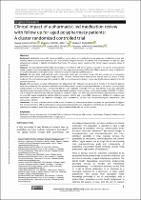Por favor, use este identificador para citar o enlazar este ítem:
https://repositorio.usj.es/handle/123456789/498
| Título : | Clinical impact of a pharmacist-led medication review with follow up for aged polypharmacy patients: A cluster randomized controlled trial |
| Autor: | Varas-Doval, Raquel

Gastelurrutia, Miguel Ángel 

Benrimoj, Shalom I. 

Garcia-Cardenas, Victoria 


Sáez-Benito, Loreto 

Martnez-Martínez, Fernando 
|
| Palabras clave : | Medication Therapy Management; Community Pharmacy Services; Pharmacies; Pharmacists; Polypharmacy; Treatment Adherence and Compliance; Randomized Controlled Trials as Topic; Spain |
| Fecha de publicación: | 21-oct-2020 |
| Editorial : | CENTRO INVESTIGACIONES & PUBLICACIONES FARMACEUTICAS |
| Citación : | Varas-Doval R, GastelurrutiaMA, Benrimoj SI, García-Cárdenas V, Sáez-Benito L, Martinez-Martínez F.Clinical impact of a pharmacist-led medication review with follow up for aged polypharmacy patients: A cluster randomized controlled trial. Pharmacy Practice2020Oct-Dec;18(4):2133. |
| Resumen : | Background: Medication review with follow-up (MRF) is a service where community pharmacists undertake a medication review with monthly follow-up to provide continuing care. The ConSIGUE Program assessed the impact and implementation of MRF foraged polypharmacy patients in Spanish Community Pharmacies. The present paper reports on the clinical impact evaluation phase of ConSIGUE. Objective: The main objective of the study was to measure the effect of MRF on the primary outcome of the number ofuncontrolled health problems. Secondary objectives were to analyze the drug-related problems (DRPs) identified as potential causes of ineffective or unsafe medications and the pharmacists’ interventions implemented during MRF provision. Methods: An open-label multi-centered cluster randomized study with comparison group (CG) was carried out in community pharmacies from 4 provinces in Spain during 6 months. The main inclusion criteria were patients over 64 years old, using 5 ormore medicines. The intervention group (IG) received the MRF service (advanced medication review-type 3 MR) whereas patients in the CG received usual care. Results: 178 pharmacies recruited 1403 patients (IG= 688 patients; CG= 715 patients). During the 6 months of the study 72 patients were lost to follow up. The adjusted multi-level random effects models showed a significant reduction in the number of uncontrolled health problems over the periods in the IG (-0.72, 95% CI: -0.80, -0.65) and no change in the CG (-0.03, 95%CI: -0.10, 0.04). Main DRPs identified as potential causes of failures of uncontrolled health problems’ treatment were undertreated condition (559 DRPs; 35.81%), lack of treatment adherence (261 DRP; 16.67%) and risk of adverse effects (207 DRPs; 13.53%). Interventions performed by pharmacist to solve DRP mainly included the addition (246 interventions; 14.67%) and change (330 interventions; 19.68%) of a medicine and educational interventions on medicine adherence (231 interventions; 13.78%) and non-pharmacological interventions (369 interventions; 22.01%). Conclusions: This study provides evidence of the impact of community pharmacist on clinical outcomes for aged patients. It suggests that the provision of an MRF in collaboration with general medical practitioners and patients contributes to the improvement of aged polypharmacy patients’ health status and reduces their problems related with the use of medicines. |
| URI : | https://repositorio.usj.es/handle/123456789/498 |
| ISSN : | 1886-3655 |
| Aparece en las colecciones: | Artículos de revistas |
Ficheros en este ítem:
| Fichero | Descripción | Tamaño | Formato | |
|---|---|---|---|---|
| Clinical impact of a pharmacist-led medication review.pdf | 709,61 kB | Adobe PDF |  Visualizar/Abrir |
Este ítem está sujeto a una licencia Creative Commons Licencia Creative Commons

